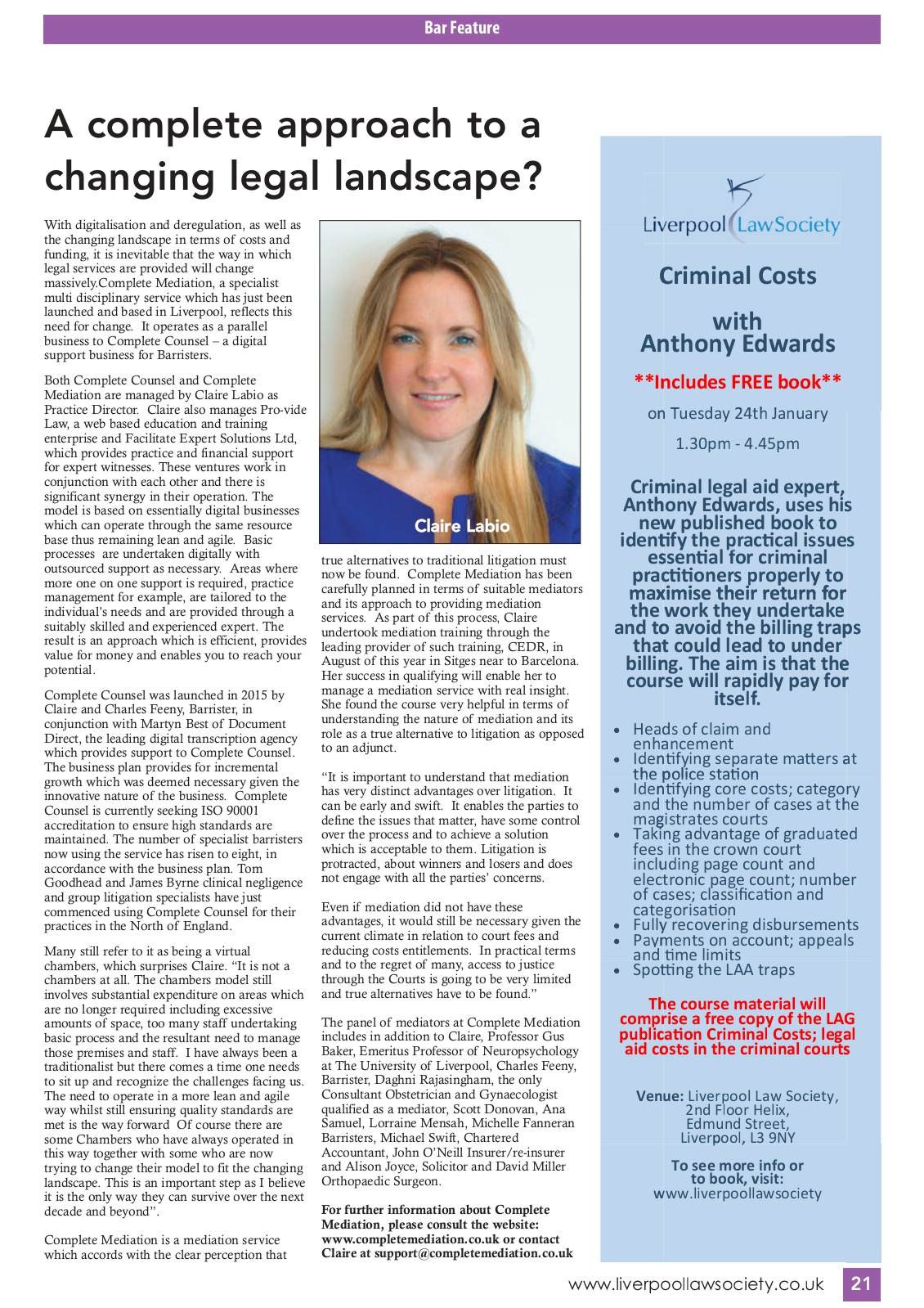Complete Mediation Launches ‘Elemental’

Complete Mediation have launched a new digital based ADR process ‘Elemental’.
This process will be moderated by qualified mediators.
For more information contact support@completemediation.co.uk.

Complete Mediation have launched a new digital based ADR process ‘Elemental’.
This process will be moderated by qualified mediators.
For more information contact support@completemediation.co.uk.
Complete Mediation are launching a new digital based ADR process ‘Elemental’. This process will be moderated by qualified mediators.
We are looking to expand our panel and are inviting Mediators with significant experience of PI/Clinical Negligence/Consumer Claims litigation to get in touch.
For further details email support@completemediation.co.uk
Delighted to have been informed that Charles Feeny has made the shortlist for the 2020 National Mediation Awards. We look forward to the online awards ceremony on 23rd September. Congratulations to all who have been nominated
Tony Wilson, well known Liverpool solicitor and former Senior Partner of Hill Dickinson, has joined Liverpool based Complete Mediation as a trained mediator. This follows a career of 43 years as a solicitor. Tony qualified as a mediator in 2018 and has now completed his training, including observations. He has already been invited to join the CEDR Conciliation Panel.
Read the full article on page 36 of the June 2019 edition of the Liverpool Law Magazine.
 Mediation is already quicker and cheaper than more traditional legal practices, and it could be about to become a far more practical solution for businesses across the UK.
Mediation is already quicker and cheaper than more traditional legal practices, and it could be about to become a far more practical solution for businesses across the UK.
A Supreme Court ruling that the imposition of fees for those bringing employment tribunal claims is unlawful is set to have an enormous impact on the number of claims, which could put some companies in severe financial danger.
The imposition of the fees led to a 79% reduction in claims over the last three years, but the ruling will no doubt result in an exponential rise in claims, which will result in increased costs and disruption for businesses.
The potential costs include meeting the claim and potentially, through the imposition of a revised fee regime, a requirement to pay a fee to defend a claim.
Not only does the decision have implications for future claims but there is a real potential for those who did not pursue previous claims, due to the level of fees involved. They will now seek to bring a claim out of time and try to argue that either it was not reasonably practicable to bring a claim within the requisite time period due to the cost of fees involved and/or that it would be just and equitable to extend the period of time for bringing a claim.
Offering mediation as an alternative will not only cut the time taken to achieve a result, but it will also be significantly more cost-effective for employers. Not only is it cheaper in the long term but less time is also lost preparing for and undertaking the full legal process, as mediation can be organised and settled within a week.
While it has a success rate of between 80-90%, mediation also means the matter is kept confidential between parties and the outside world, meaning the effects on the business will be kept to the minimum.
Complete Mediation has a diverse team of experienced mediators, a number with Employment Law backgrounds who can assist you in resolving your dispute.
Mediation fees start from just £200 plus VAT, so for more details, please contact support@completemediation.co.uk or call us on 0151 556 2619 to see how we can help you.
Sir Winston Churchill came from a time when wit was often to be found in an elegant turn of phrase or clever use of language. Of course, there was still humour to be found in the slapstick world of Laurel and Hardy or Abbott and Costello, but the wordsmiths of the day did not need to resort to the occasional expletive to get a cheap laugh as some of them do today.
For another example of a keen wit, and a little earlier in time, a lady notorious for courting celebrities sent George Bernard Shaw an invitation reading: “Lady — will be home on Tuesday between four and six o’ clock.” Shaw returned the card annotated elegantly, politely and with brevity, “Mr. Bernard Shaw – likewise.”
So, Sir Winston, well known for his pithy remarks is credited with saying that “democracy is the worst form of government except for all the others that have been tried”. Is it possible that he might have said:
“mediation is the worst form of dispute resolution except for all the others that have been tried”?
The truth of the matter is, while I agree with Sir Winston Churchill’s remarks about democracy, I am not at all a believer in the merits of my own prediction of what he might say about mediation.
In discussions with colleagues from the insurance market, and often times the lawyers acting for them, I have come across some views that would support the above notion and probably an equal number that would not. Like so many initiatives that move away from age-old practices, there are usually two main drivers of one’s view of the new way. Firstly, there is the willingness to change. Secondly, there is the initial experience of the process, driven by the operation of the proceedings, the outcome and, to some extent, how those measure up against your expectations of the new way. There is a danger here, however, that for the naysayers this could become a self-fulfilling prophecy. It is really important to keep an open mind as the process is experienced for the first few times.
Keep in mind that as disputes have arisen through the years the directed decision making of a finder of fact, be it judge, jury or arbitration panel, has been the way of the world. Mediation is relatively young when you consider King Solomon was making parental rights’ decisions over two thousand years ago!
Mediation may be the best form of dispute resolution or indeed the worst but it is the only process that remains confidential, without prejudice, focussed on the interests of the parties and only settled when all sides to the dispute unequivocally agree to a solution and, most importantly, nobody has the solution imposed upon them.
Mediation is starting to take a stronger foothold in the process of dispute resolution in the UK and Europe with mixed success. In Italy, for example, compulsory mediation of civil and commercial disputes was introduced in March 2011 and two things happened. First there was a rush of lawsuits being filed before the effective date of the new requirement came in, in order to avoid the requirement. Secondly, the lawyers were very reluctant, particularly on the plaintiffs’ side to participate actively. In particular, the OUA (Unitarian Body of Lawyers) organised many strikes all over Italy against the regulated mediation mechanism. These tactics, however, have not delayed the inevitable progress of the requirement becoming routine and it is likely we will see the same change here in the United Kingdom. The NHSLA has just embarked on a process of putting together a panel to assist them in mediating some medical negligence and civil liability lawsuits filed against the NHS, as well as resolving cost-related disputes by way of mediation. Informed sources predict the Ministry of Justice and the Ministry of Defence will be following suit in due course.
The truth remains that many people are either uninformed, or misinformed, about the process. I have been asked over the years if I was prepared to enter into “binding mediation”. Here is the first big misunderstanding. The parties bind themselves to the solution if, and only if, they like it. If it is not in their interests, or they are unsatisfied with the details of the proposal, then there is no obligation to agree and there is no person telling them that “the solution is the solution”.
What they do have to consider of course is the alternative course of action. In Getting to Yes[1], an excellent read for anyone being involved in negotiation or mediation whether as party, counsel or mediator, Fisher and Ury introduce the concept of the Best Alternative To A Negotiated Agreement or BATNA. This is where one considers what is on the table and weighs it against the best, of many, outcomes that may arise in the absence of making a deal during the mediation process.
So at the appropriate time the mediator may ask all sides to the dispute to consider their BATNA but only for them to evaluate the proposal and give proper consideration to saying either “Yes” or “No” to what is available.
This ‘non-binding until it is agreed’ method of making proposals, offers and counter-offers is tied inextricably to the without prejudice and confidential nature of the process. Parties can share information about their case, and their view of success or otherwise, as well as what is important to them in finding a solution to the problem with the mediator in complete confidence. They know that only if they give their express permission will said information be shared with any other party to the dispute. It is the unique role of mediators, as they are not finders of fact, which allows them to take on board this information and hold it in confidence. Equally, the parties are able to share it without having any concern that it will affect the outcome of their case or prejudice a fact-finder against them. Only mediation has this factor, which I see as not only the key difference with other forms of dispute resolution process. I also see this as the main reason that in the long run it will become the preferred method of resolving commercial and other disputes.
Returning to Winston then, my view would be that while democracy probably is the worst form of government apart from all the others, and in the same way as there are different approaches to electing governments using a democratic process, first past the post, proportional representation, electoral colleges etc., there will be different approaches to the mediation process depending on the circumstances of the case and the parties involved. Nevertheless, my revised quote would be that “Mediation is the best form of dispute resolution, especially when one considers the shortcomings of all the others.”
John O’Neill FCII
Connect with John on LinkedIn
23 January 2017
[1] Getting to Yes by Roger Fisher & William Ury published by Random House Business Books
Claire Labio of Complete Mediation was featured in the recent issue of Liverpool Law. View the article below or take a look at the complete issue here (Claire’s issue appears on page 21).

